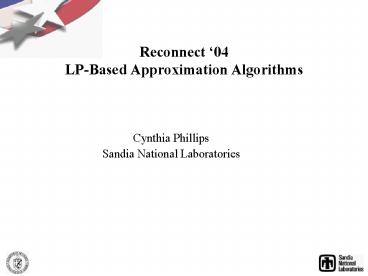Reconnect PowerPoint PPT Presentation
Title: Reconnect
1
Reconnect 04LP-Based Approximation Algorithms
- Cynthia Phillips
- Sandia National Laboratories
2
Linear Programming (LP) Relaxation-Based
Approximation
- Variables can take rational values (relax
integrality constraints) - Efficiently solvable gives lower bound on
optimal IP solution - Common technique
- Use structural information from LP solution to
find feasible IP solution - Bound quality using LP bound
- Integrality gap (best IP solution)/(best LP
solution) - This technique cannot prove anything better than
integrality gap
3
Integer Program (IP) for capacitated network
design
- A simple IP for capacitated network design
- Where d(C) is the maximum demand di for any pair
that crosses cut C - xe 1 if edge e is selected
4
Knapsack Cover (KC) Inequalities
A
C
5
Finding An Approximate Solution
- Let
- Set of edges at least half selected by LP
- Select all these edges
- Increases cost (for A) by factor of 2
- Now much meet demand D(A) D - u(A) with rest of
edges
6
Finding an Approximate Solutions
- Sort edge by ue
- Consider the three cases
7
Finding an Approximate Solution
- xe q/p rational
- r is least common multiple of denominators so rxe
integral for all e - Make 2rxe copies of xe
- (convex multipliers will be 1/r)
8
Approximate solution for knapsack (gap 2)
- 2rxe copies of edge e, sorted by capacity
- Place in r buckets, round robin
- Each bucket will be a solution Si
- No edge in any solution twice
9
All buckets are Feasible
ek4 ek2 e1
lt
ek3 ek1
lt
First Bucket (biggest)
Last Bucket (smallest)
10
All Buckets Feasible
- Suppose
- We have
- So
for all buckets - From total capacity
- Contradicts KC inequality
11
Separation
- Only have to satisfy KC inequality for
- Add these cuts if violated till we get an LP
solution where KC inequality holds for its A.
12
Polynomial Time
- Really only m1 distinct solutions
13
A Scheduling Example
- Given n jobs J1, J2, , Jn
- Job Ji has length pi, weight wi
- Precedence constraints mean Ji
must finish before Jj starts - No preemption, one machine
- Cj completion time of job Jj
- Goal minimize
- NP-complete. Well get a 4-approximation
14
Integer Programming Formulation
- Subject to
15
Constraint One Job at a Time
T-pj
t
t-1
t1
t2
tpj-1
...
t-1
- Consider all (job, finish time) pairs that would
run over (t-1, t
16
Precedence Constraints
- If job Jk finishes by time t pk, then job Jj
must finish by time t
17
LP relaxation, Fractional Schedule
xjt
pj
18
Fractional Schedule x
- Fractional Completion Time
- Midpoint min t such that
19
Approximation Algorithm
- Solve LP
- Compute midpoints for all jobs
- Order by midpoints
20
Approximate Schedule is feasible
- No preemption
- One job at a time
- Precedence constraints
- Midpoint of Jj lt Midpoint of Jk
21
Proof of Quality Road Map
- Relate Cj to LP values
- Renumber jobs by midpoint
- Well show
22
Upper Bound on Completion Times
t
t-pj
- At time tj fractional schedule has done pj/2
work. - Since tk? tj for kltj, schedule has done pk/2
work on Jk. - One unit of work/time unit ?
- But by construction
xjt
23
Lower Bound on LP values
- By definition
- So
24
Proof of Quality
- Therefore
25
Comments
- Can create alternative schedules using ? point
tj? - LP-based approximation algorithms can give
feasible solutions in branch and bound - Other LP-based approximation algorithms for
scheduling problems are based on
matching/assignment

